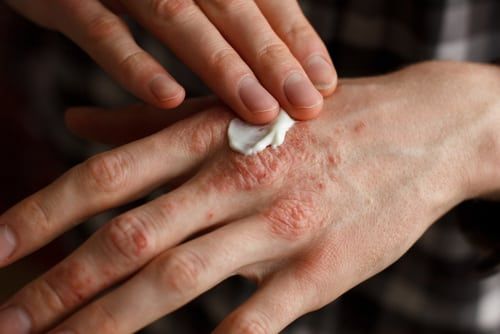Psoriasis is an immune-mediated disease that causes raised, red, scaly patches to appear on the skin, especially the elbows, knees and scalp. Scientists do not know the exact causes of psoriasis but feel that the immune system and genetics play a major role. Psoriasis is associated with other serious health conditions such as diabetes, heart disease, and depression. About 30 percent will develop joint pain and psoriatic arthritis. Psoriasis can be mild, moderate or severe in terms of how much area of skin it involves. Some patients are nearly completely covered with this skin condition. This disease has been shown to affect a person’s quality of life.
Treatments for mild psoriasis can include topical prescriptions for steroid creams, synthetic Vit D cream, and retinoids. Systemic medicines are pills taken by mouth and are used for patients with moderate or severe psoriasis or psoriatic arthritis. Some of these systemic medicines include methotrexate, ortezla, Soriatane, and cyclosporine. These medicines cannot be prescribed unless a full medical history is done and their risk and benefit are determined for each individual patient.
Biologic drugs have a major impact on the treatment of psoriasis because they have been extremely effective in controlling the skin and joint disease. Biologic drugs are usually given by injection. Biologics are different from traditional drugs that impact the entire immune system. Biologics just target part of the immune system. The biologics used to treat psoriasis focus on the T cell in the immune system and target small proteins in the immune system such as tumor necrosis factor or interleukin. Some patients will come to our office for the injection of a Biologic drug a few times a year, and other patients will be taught how to self-inject a Biologic medicine a few times a month at home.
If you need help managing your psoriasis, please call our office for an appointment.






